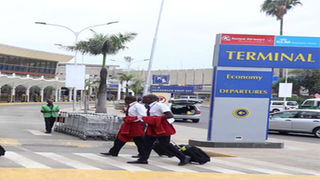Developing story: Iranian President Ebrahim Raisi confirmed dead in chopper crash

Jomo Kenyatta International Airport in Nairobi.
| File | Nation Media GroupAt JKIA with ‘biltong’ and ‘kitenge’
A few days ago, President William Ruto announced that Kenya would remove visa requirements for all African visitors by the end of this year.
This business of freedom of movement for Africans around Africa can be confusing. About two-thirds of the continent’s 54 independent states allow entrance for Africans from at least a dozen other African countries without pre-departure visas.
About half that number grants Africans paid visas upon arrival. Only about six allow all Africans in visa-free.
If Kenya gets to allow all Africans visa-free entry, it would be significant; it’ll stand out as the only member of Africa’s top 10 “superpowers” to do so.
Hours after President Ruto spoke, Kenya Revenue Authority (KRA) announced that it was tightening Customs rules for arriving passengers. It announced that “all goods, whether new or used, are subject to taxation...you will be allowed to carry personal or household items worth US$500 and below. Anything above the amount shall be subject to tax.”
Caesar’s dues have to be paid, but by opening doors for all sons and daughters of the soil to visit visa-free and then rolling out tight tax rules, Kenya has commissioned an African drama of the ages.
The thing is that our people don’t travel light. Watch carefully when you are waiting for a passenger to arrive at any African airport. Of the first 30 or so fellows who will come out first—because they didn’t have checked-in baggage—only five will be our people.
We check in the maximum luggage and then carry more than is allowed on board.
At one time in Dubai, and another at Charles de Gaulle Airport, some unapologetic West Africans were checking in ahead of me in the queue. On both occasions, they had several suitcases plus several “Ghana Must Go” bags. They were making a racket because they had been asked to pay extra. The airline had weighed the luggage. However, they were going by their sense of things.
Our ancestors told us that it is bad manners to count an African’s cattle and children. Some Africans take that spirit to their luggage. Supermarkets like Carrefour and Naivas have forced us to measure things like potatoes, tomatoes, vegetables, oranges and maize. Imagine, measuring maize! Otherwise, at the mama mboga roadside markets and rural stalls, where most Africans shop, we “measure with the eyes” or proxy weights.
Tomatoes for Sh100 are sold at that price because they look like it. Potatoes in an old five-litre tin of USAid humanitarian cooking oil is sold for, say, Sh250 because it looks the part. One piece of maize is Sh50, simple and clear. How do you begin measuring its weight?
‘Mitumba’
How do you determine what is new, old or worth $500 when the receipt isn’t enough? Mitumba (second-hand clothes) are the biggest business in some African countries, worth billions of dollars as a continental trade. For example, in 2019, Africa accounted for nearly a third of global imports of second-hand clothes, estimated at $5 billion. The data also suggested that about 80 per cent of Africa’s population wears second-hand clothes, mainly imported from the West, India and Pakistan.
Most of the cars imported into Africa are second-hand, third-hand, fourth-hand and, in some countries, even sixth-hand. Africa is home to 40 per cent of the world’s used cars.
However, when we go to the mitumba market or roadside car “showroom”, we don’t go back home and say we bought a used shirt, skirt or vehicle. We say we bought a “new” car.
Your mother will come from the village with her friends from the church to the big city to celebrate your new car. At his local pub, your father will brag that “my son has bought a new car” and his buddies will buy him a congratulatory round. If a mitumba shirt is new, then why can’t a new shirt be old?
The really complicated bit is the “social package” we carry. A Nigerian mother-in-law arrives at JKIA. She’s coming to see her son and daughter-in-law, who live and work in Nairobi. Let’s leave the son aside for now and focus on the daughter-in-law.
She has carried 12 pieces of fabric (kitenge) for her. But the intention is not to give all of them to her; she is to choose four pieces, then the mother-in-law will go back to Maiduguri with the eight she didn’t fancy.
Do you get her to pay tax on all 12 pieces, or four—maybe six? Try explaining that to a marvellously berobed 70-year-old West African matriarch! And, African mums will carry complicated things for their expectant daughters-in-law—herbs and special soil balls. So, you look in her bag and she has half a kilogramme of soil balls. You ask her, “How much is that worth?”
And if she has arrived from southern Africa, she’s carrying packets of biltong (dried, cured meat). If you seize or tax it, she will curse you.
I don’t want to be the Customs officer at JKIA. If I were, I would angle for the flights arriving from London or Amsterdam.
- Mr Onyango-Obbo is a journalist, writer and curator of the “Wall of Great





